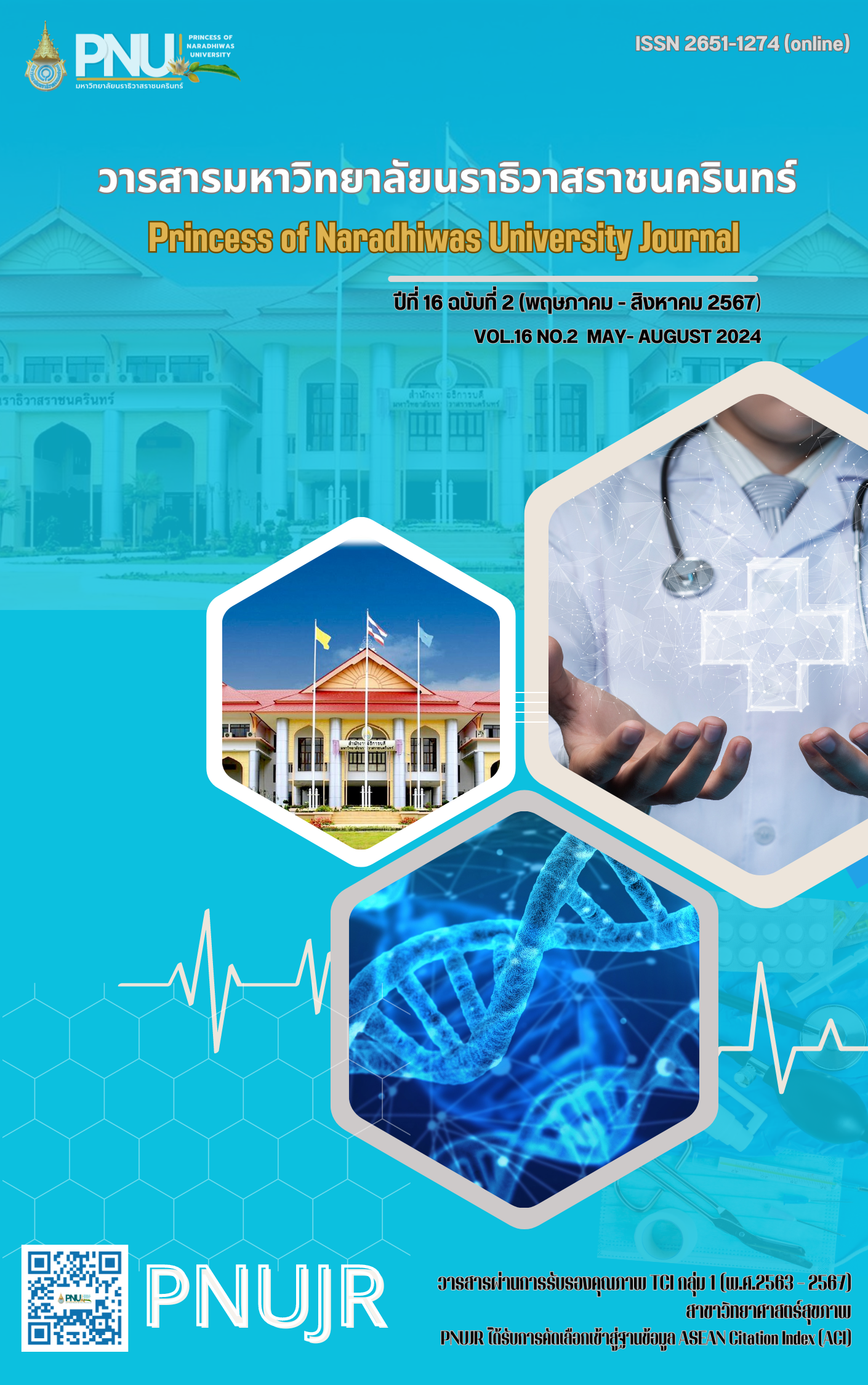Development of Potential of Caregivers to Screen Dementia for Community-dwelling olders by Using the IQCODE tool
Siranee Sihapark
Keywords:
Caregivers in community, Dementia, screening, IQCODE measurementAbstract
The purpose of this research and development study was to examine process development of potential of caregivers to screen dementia for older adults living in community. The sample group consisted of 63 caregivers and 1756 older adults in the community. Descriptive data analysis used number, percentage, mean, and standard deviation and statistical comparison analysis were Paired t-test, Chi-square test and 95% CI.
The following findings were identified: 1) 96.83% of caregivers in the community were women, with an average age of 50; 58.72% had completed secondary school or above a vocational qualification; and 10% had no prior experience providing care for older adults; 2) The procedure development of potential of caregivers to screen dementia for older adults in community included training of potential for caregivers to screen dementia for older adults in the community, developing a curriculum for improving potential of caregivers to screen dementia for older adults in the community, and selection a dementia screening tool for older adults in the community; 3) The results of development of potential for caregivers to screen dementia for older adults in the community by using the IQCODE measurement revealed that the knowledge level of caregivers following training was statistically substantially greater than score of caregivers before to training (p <0.01). Negative attitude level of caregivers was shown to be statistically considerably lower after the training than it was before (p <0.01). Nevertheless, there was no statistically significant difference in the positive attitude level of caregivers before and after the training; and 4) the IQCODE measurement, which caregivers used to screen for dementia in older adults living in the community, revealed 6.44% of the risk of dementia incidence (95%CI 5.4 – 7.7).
Dementia is a significant problem facing in older adults. Development of potential of caregivers to screen dementia for older adults living in the community by using appropriate and effective measuring techniques is important initial step in gaining access to the health care system for older adults with dementia.
References
Aekplakorn, W., Puckcharern, H., Thailkla, & Satheannoppakao, W. (2014). National Health Examination Survey VI (NHES VI) report. Health Systems Research Institute.
Borson, S., Scanlan, J.M., Chen, P., & Ganguli, M. (2003). The Mini-Cog as a screen for dementia: validation in a population-based sample. Journal of the American Geriatrics Society, 51(10), 1451-4. http://doi.org/10.1046/j.1532-5415.2003.51465
Chen, H., Lekoff, S., Chuengsatiansup, K., Sihapark, S., Hinton, L., Gallagher-Thompson, D., Tongsiri, S., Wisetpholchai, B., Fritz, S., Lamont, A., Domlyn, A., Wandersman, A., & Marques A. H. (2022). Implementation Science in Thailand: Design and Methods of a geriatric Mental Health Cluster – Randomized Trail. Psychiatric Service. 73(1), 83 – 91. http://doi.org/10.1176/appi.ps.202000028
Chuakhamfoo, N.N., Phanthunane, P., Chansirikarn, S., & Pannarunothai S. (2020). Health and long-term care of the elderly with dementia in rural Thailand: a cross-sectional survey through their caregivers. BMJ Open, 10(3), e032637. http://doi.org/10.1136/bmjopen-2019-032637
Dementia Forecasting Collaborators. (2019). Estimation of the global prevalence of Dementia in 2019 and forecasted prevalence in 2050: an analysis for the Global Burden of Disease Study 2019. Lancet Public Health, 7(2), e105-e125. http://doi.org/10.1016/S2468-2667(21)00249-8
Hodkinson, H. M. (1972). Evaluation of a Mental Test Score for Assessment of Mental Impairment in the Elderly. Age Ageing, 1(4), 233 - 238. http://doi.org/10.1093/ageing/1.4.233
Jitapunkul, S., Pillay, I., & Ebrahim, S. (1991). The Abbreviated Mental Test: Its Use and Validity. Age Ageing, 20(5), 332 - 336. http://doi.org/10.1093/ageing/20.5.332
Jorm, A.F. (1994). A short form of the Informant Questionnaire on Cognitive Decline in the Elderly (IQCODE): development and cross-validation. Psychological Medicine, 24(1), 145-153. http://doi.org/10.1017/S003329170002691X
Kongpakwattana, K., Dejthevaporn, C., Krairit, O., Dilokthornsakul, P., Mohan, D., & Chaiyakunapruk. N., (2019) A Real-World Evidence Analysis of Associations Among Costs, Quality of Life, and Disease-Severity Indicators of Alzheimer's Disease in Thailand. Value Health, 22(10), 1137 - 1145. http://doi.org/10.1016/j.jval.2019.04.1937
Na Chiangmai, N., & Wongupparaj, P. (2020). Dementia screening tests in Thai older adults: a systematic review. Journal of Mental Health of Thailand, 28(3), 187 – 198. https://www.academia.edu/87191003/Dementia_screening_tests_in_Thai_older_adults
National Statistical Office. (2021). The 2021 Survey of the Older Persons in Thailand. National Statistical Office. https://www.dop.go.th/ download/knowledge/th1663828576-1747_1.pdf
Puengsema, R. (2020). Nursing Role in Caring for Persons with Dementia. Thai Red Cross Nursing Journal, 13(1), 15 - 24. https://he02.tci-thaijo.org/index.php/trcnj/article/view/243779
Senanarong, V., Assavisaraporn, S., Sivasiriyanonds, N., Printarakul, T., Jamjumrus, P., Udompunthuruk, S., & Poungvarin, N. (2001). The IQCODE: An Alternative Screening Test for Dementia for Low Educated Thai Elderly. Journal of the Medical Association of Thailand, 84 (5), 648 – 655. https://pubmed.ncbi.nlm.nih.gov/11560213/
Sihapark, S., Amornrojanavaravutti, W., Kam-on, N., Srioad, P., Srihanoo, P., & Tupsai, T. (2021) Problems and Needs of Long-Term Care for Elderly Community Dwellers Supported by Long Term Care Fund in Khon Kaen Province. Regional Health Promotion Center 9, 15(36), 44 – 62. https://he02.tci-thaijo.org/index.php/RHPC9Journal/issue/archive
Trongsakul, S., Lambert, R., Clark, A., Wongpakaran, N., & Cross, J. (2015). Development of the Thai version of Mini-Cog, a brief cognitive screening test. Geriatrics & Gerontology International, 15(5), 594 - 600. http://doi.org/10.1111/ggi.12318
Vongchavalitkul, B., Sanguanwongwan, W., Chatchaisucha, S., Limsarun, T., Thaisamak, S., & Ruengkhajhon, K. (2016). Knowledge and Attitude of the Elderly Caregivers: A Case Study of Thammapakorn Phoklang and Watmuang Elderly Care Center Nakhonratchasima Province. Journal of Business Administration the Association of Private Education Institutions of Thailand, 5(2), 74 – 91. https://so02.tci-thaijo.org/index.php/apheitvu/issue/view/8165
World Health Organization. (2017, February 27). Global action plan on the public health response to dementia 2017-2025. https://www.who.int/publications/i/item/global-action-plan-on-the-public-health-response-to-dementia-2017-2025.
World Health Organization. (2020, May 29). The Epidemiology and impact of dementia: Current state and future trends. https://www.who.int/mental_health/neurology/dementia/dementia_ thematicbrief_epidemiology.pdf
Downloads
Published
How to Cite
Issue
Section
License
Copyright (c) 2024 Princess of Naradhiwas University Journal

This work is licensed under a Creative Commons Attribution-NonCommercial-NoDerivatives 4.0 International License.




